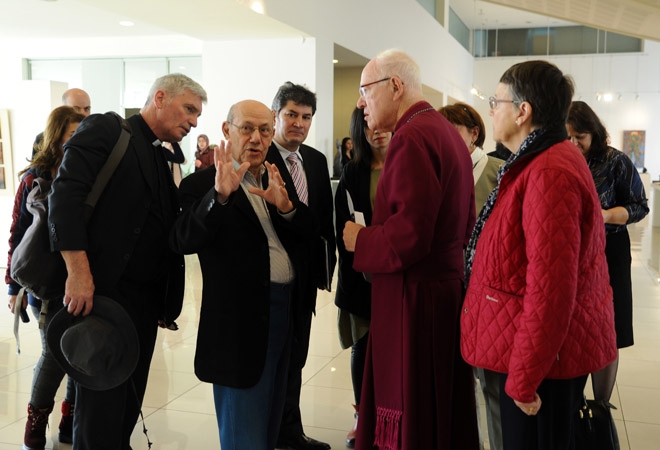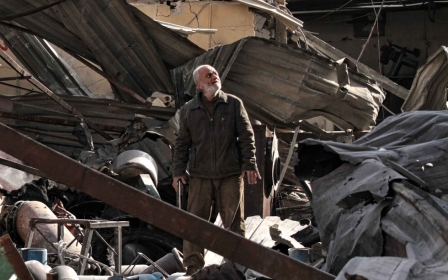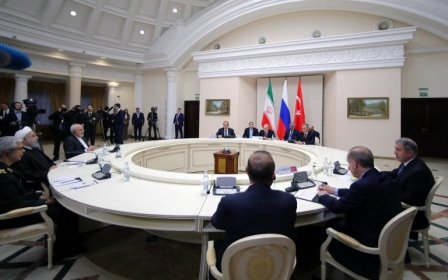Former British archbishop meets top Assad adviser in Damascus

A group of British peers and Christian leaders, including the former Archbishop of Canterbury, has been accused of providing support to President Bashar al-Assad after they travelled to Damascus and met the Syrian leader’s most senior adviser.
Lord Carey, who led the Church of England for more than a decade until he retired in 2002, has been accused of providing a propaganda victory to a war criminal after he joined fellow religious figures and members of the House of Lords on a week-long visit to Damascus.
According to Syrian state media, the group has met with Bouthaina Shaaban, a key Assad advisor who has been described as the “dark side of Syria’s public face” and is named on American and European Union sanctions lists as complicit in Syrian government violence.
Shaaban reportedly used the meeting to attack the UK government for allegedly supporting Islamic State and other militant groups and said the Syrian government was the victim of a “Zionist plan for the region”, according to Syrian state media.
Shaaban is a prominent spokesperson for the Assad government and has repeatedly said that the six-year war is nearly over, and vowed to confront “illegitimate” forces in the country. The meeting with Shaaban comes as the Assad is attempting to present himself as the sole and legitimate option for political power in the country.
The British delegation, which includes Lord Raymond Hylton, cross-bench peer Baroness Caroline Cox, and priests Andrew Ashdown and David Thomas, also visited a cultural centre on Monday and met with senior members of the Syriac Orthodox Church, which has been openly supportive of Assad’s government.
Syrian state media has reported extensively on the visit by the “British delegation”, prompting fears in Westminster that the delegation is likely to meet with Assad himself, bolstering the legitimacy of his government as it sends a delegation to attend peace talks in Geneva this week.
John Woodcock, a Labour MP and the vice-president of the All Party Parliamentary Group on Syria, told MEE: “The Assad regime has committed appalling crimes against the people of Syria and it should be condemned in the strongest terms by everyone.
He would horrify many Christians if he chose to meet Bashar al-Assad himself
- John Woodcock, Labour MP
“The Archbishop should be careful not to allow his good name to be used for propaganda purposes. In particular, he would horrify many Christians if he chose to meet Bashar al-Assad himself - an act that this brutal pariah would use to bolster his position when focus should remain on putting the spotlight on his grotesque crimes against humanity.”
Baroness Hussein-Ece, a Liberal Democrat peer, told MEE: “If they're meeting Assad, as they've done before, then this shows a complete lack of judgement and humanity for the well documented hundreds of thousands of deaths of Syrians of all faiths, that he is responsible for, not least the use of chemical weapons.”
No comment on Assad meeting
Lord Carey’s office could not confirm if he would meet Assad this week, but said the intention of the trip was to highlight the plight of Christians in Syria who have been targeted by Islamic State militants.
“The aim of this visit with Baroness Cox and others is to learn about this complex situation rather than take sides. Both Baroness Cox and Lord Carey have a long-standing concern for persecuted Christians,” a spokesperson said in a statement.
"They are there to support the Church and the Christian community which has been targeted by the Islamic State and other jihadist groups and feels abandoned by the international community."
But critics say the visit has instead given legitimacy to a leader who has used chemical weapons on his own people and stands accused of war crimes.
“For somebody as senior as Lord Carey to do this at such as sensitive moment is very ill advised,” Chris Doyle, the director of the Council for Arab-British Understanding, told MEE.
The Syrian regime is already using this visit for its own propaganda purposes
- Chris Doyle, CABU director
Doyle added: “The Syrian regime is already using this visit for its own propaganda purposes, while at the same time is still bombing, still killing civilians and behaving in a way that should not be endorsed at such a high-profile level. This visit is naive and unlikely to do any good at all.”
Lord Carey has previously called on the British government to “crush” Islamic State in Syria and attacked “politically correct” government officials who he said were “institutionally biased” against bringing Syrian Christian refugees to the UK.
Baroness Cox is best known for known for trying to invite the far-Right Dutch MP Geert Wilders to Parliament before the government banned him from entering Britain, and has also spoken out about Christian persecution. A spokesperson for Cox declined to comment.
Since the start of the Syrian conflict in 2011, the Syrian government has attempted to present itself as the champion of religious minorities, including Christians, in the face of brutal violence and repression from Islamic State and other militants. Analysts also say that President Assad has tried to paint all Syrian rebels as "jihadists" who would treat minorities with the same brutality as Islamic State group.
Lord Carey’s visit comes as least 80 people were killed in just over 24 hours of suspected Syrian government and Russian shelling near Damascus and in the east of the country.
The shelling and air attacks, which came shortly before Damascus said it would send a delegation to Geneva, killed dozens of civilians in the eastern province of Deir Ezzor and besieged Eastern Ghouta, outside the capital.
The visit comes after a similar visit last year which saw Baroness Cox face criticism for holding a meeting with Assad after which she reportedly said the Syrian leader had an “openness for the development of civil society, democracy and change”, claims which have been widely dismissed by rights groups.
Middle East Eye propose une couverture et une analyse indépendantes et incomparables du Moyen-Orient, de l’Afrique du Nord et d’autres régions du monde. Pour en savoir plus sur la reprise de ce contenu et les frais qui s’appliquent, veuillez remplir ce formulaire [en anglais]. Pour en savoir plus sur MEE, cliquez ici [en anglais].




